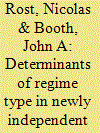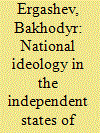| Srl | Item |
| 1 |
ID:
087942


|
|
|
|
|
| Publication |
2009.
|
| Summary/Abstract |
The Commonwealth of Independent States (CIS) was designed to manage the collapse of the Soviet Union and foster post-Soviet cooperation in political, economic, and security spheres. Over a decade into its existence, most analysts would rate it a failure: many post-Soviet states do not participate in CIS ventures, the institutional machinery of the CIS is weak, and Russia, the most dominant post-Soviet state, has tended to favour bi-lateral relationships over multi-lateral institutions. Why is this the case? This article looks at the CIS through the prism of theories of regionalism, demonstrating that the CIS was handicapped on many fronts, including emergent multi-polarity in the post-Soviet space and domestic-level political considerations in many post-Soviet states.
|
|
|
|
|
|
|
|
|
|
|
|
|
|
|
|
| 2 |
ID:
083265


|
|
|
|
|
| Publication |
2008.
|
| Summary/Abstract |
Abstract. Since 1945, newly independent states have differed from longer lived states in their greater risk of violent conflict and more challenging environment for democratisation. The authors of this article theorise that certain economic, demographic, violence-related and external factors should affect the regime type (level of democracy versus autocracy) in newly independent states. Examining exclusively newly independent states that have undergone major political transitions allows one to determine factors favouring democracy over autocracy under such volatile circumstances. The authors test several hypotheses, using cross-sectional and cross-sectional time-series analyses, and find that economic development elevates the level of democracy in new states. Cultural heterogeneity has no effect, but external factors play an important role. Genocide and politicide reduce democracy, while civil wars have the opposite effect. These findings prove robust to alternative measurements of the dependent variable and alternative model specifications
|
|
|
|
|
|
|
|
|
|
|
|
|
|
|
|
| 3 |
ID:
104588


|
|
|